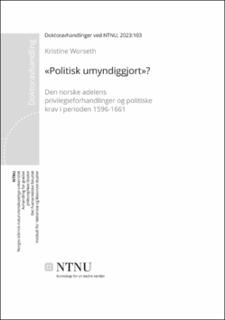| dc.description.abstract | Sammendrag
Denne avhandlingen undersøker den norske adelens petisjoner og forhandlinger med sentralmyndighetene i Danmark-Norge i perioden 1596-1661. Hensikten har vært å undersøke den norske adelens rolle og funksjon som Norges førende stand i en periode hvor den ikke hadde adgang til formelle, politiske organer slik som det danske riksrådet. For å besvare spørsmålet vil avhandlingen analysere og sammenligne hvordan den norske adelen benyttet sine ulike forhandlinger med kongen eller hans representanter i perioden til å fremme både sine standsmessige og sine politiske mål, og hva disse målene var. Avhandlingen søker dessuten å påvise mulige strategiske vurderinger som påvirket når og hvor adelen forhandlet om konkrete saker, samt potensielle samarbeidspartnere og støttespillere som adelen benyttet seg av.
Avhandlingen har avdekket at adelen fulgte tre hovedlinjer i kravene av standsmessig karakter: likestilling innad i den norske adelen, likestilling mellom den norske og den danske adelens privilegier, og ønsker om handelsspesifikke privilegier tilpasset norske forhold. Av de politiske kravene var disse hovedsakelig militære krav rettet mot opprettelsen av norske hærstyrker og/eller andre utbedringer i det norske forsvaret. Undersøkelsen har videre påvist at alle forhandlinger om privilegier måtte føres direkte med kongen, helst på de norske kongehyllingene, om adelen skulle lykkes i forsøket. Forhandlinger via herredager og utsendinger hadde lavere suksessrate. Politiske krav ble derimot utelukkende fremmet via kongehyllingene eller, fra 1628, stendermøtene. Denne utviklingen hang sammen med et annet funn som avhandlingen har avdekket. Da stendermøtene i Norge ble gjenopprettet i 1628 ble det skapt en politisk arena som muliggjorde formelle forhandlinger direkte med kongens representant, stattholderen, i dagsaktuelle saker knyttet til skattlegging og forsvar. Videre kan det påvises en økende grad av sammenfall mellom stattholdernes og de norske stendenes forsvarspolitiske og fiskale interesser fra og med Jens Juels stattholderperiode. Dette ser ut til å ha resultert i et samarbeid mellom de norske stendene og stattholderne som fortsatte frem mot 1660. Fra og med Christoffer Urnes stattholderperiode kan det tilsvarende påvises et økende samarbeid mellom den norske adelen og stattholderen også når det gjaldt privilegieforhandlingene. Det hang sammen med at stattholderne begynte å investere i norsk jordegods, og dermed tjente økonomisk på å forbedre de norske adelsprivilegiene.
Abstract
The thesis examines the Norwegian nobility’s petitions and negotiations with the central authority in Denmark-Norway between the years 1596-1661. The purpose of the thesis has been to explore the Norwegian nobility’s role and function as Norway’s leading estate during a period in which it was excluded from Denmark-Norway’s formal political organs, such as the Danish council of the realm. To answer the question, the thesis analyses and compares how the Norwegian nobility used its various negotiations with the king or his representatives to achieve both their estate-exclusive and their political goals and examines the nature of these goals. Additionally, the thesis seeks to identify strategic factors that affected when and where the nobility made specific demands and any potential alliances or patrons.
The thesis concludes that the Norwegian nobility’s estate-exclusive goals fell into three categories: equality within the Norwegian nobility, equality between the Norwegian and Danish nobility, and privileges concerning production and trade that were especially important for Norway. The political goals were almost exclusively military and sought to establish and maintain armed forces and garrisons in Norway and/or make other military improvements. The thesis has further revealed that all negotiations over noble privileges had to be conducted directly with the king, preferably as part of the king’s Norwegian acclamation ceremony, if the noblemen were to be successful in their attempts. Negotiations during the high court sessions (“Herredager”) or those undertaken by representative noblemen travelling to the Danish court were less likely to succeed. Political goals were almost exclusively made during the Norwegian acclamation ceremony or, especially after 1628, as part of the meeting of the estates. This development is connected to another significant discovery in this thesis. When the Norwegian meeting of the estates was reintroduced in 1628, it created a political arena that enabled formal negotiations directly with the king’s representative, the viceroy of Norway, in current affairs concerning taxes and defence. Furthermore, we can trace an increasing correspondence between the defence and fiscal policies of the viceroys and the Norwegian estates from Jens Juel’s time in office. This correspondence appears to have developed into cooperation between the Norwegian estates and the viceroys until 1660. From the time of viceroy Christoffer Urne we can trace additional correspondence and cooperation regarding the nobility’s estate-exclusive goals. The reason was the viceroys’ increasing habit of investing in Norwegian estates; thus, they had a personal financial interest in supporting the nobility’s cause. | en_US |
